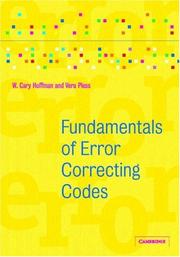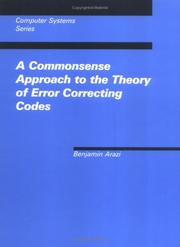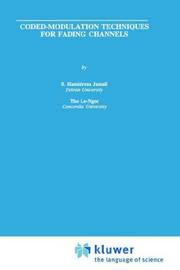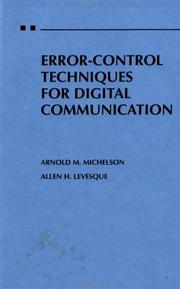| Listing 1 - 10 of 63 | << page >> |
Sort by
|
Book
ISBN: 1538603527 1538603535 Year: 2017 Publisher: Piscataway, N.J. : IEEE,
Abstract | Keywords | Export | Availability | Bookmark
 Loading...
Loading...Choose an application
- Reference Manager
- EndNote
- RefWorks (Direct export to RefWorks)
On line testing and more generally design for robustness, are important in modern electronic systems. These needs increased dramatically with the introduction of nanometer technologies, which impact adversely noise margins process, voltage and temperature variations aging and wear out soft error and EMI sensitivity and power density and make mandatory the use of design for robustness techniques for extending, yield, reliability, and lifetime of modern SoCs Design for reliability is also mandatory for reducing power dissipation, as reducing voltage for reducing power strongly affects reliability by reducing noise margins and thus the sensitivity to soft errors and EMI, and by increasing circuit delays which increase sensitivity to timing faults Design for Security is also strongly related with Design for Reliability, as security attacks are often fault based IOLTS is an established forum for presenting novel ideas and experimental data on these areas.
Electronic circuit design --- Error-correcting codes (Information theory) --- Codes, Error-correcting (Information theory) --- Error-detecting codes (Information theory) --- Forbidden-combination check (Information theory) --- Self-checking codes (Information theory) --- Artificial intelligence --- Automatic control --- Coding theory --- Information theory
Book
ISBN: 1509015078 1509015086 Year: 2016 Publisher: Piscataway, New Jersey : Institute of Electrical and Electronics Engineers,
Abstract | Keywords | Export | Availability | Bookmark
 Loading...
Loading...Choose an application
- Reference Manager
- EndNote
- RefWorks (Direct export to RefWorks)
Error-correcting codes (Information theory) --- Electronic circuit design --- Codes, Error-correcting (Information theory) --- Error-detecting codes (Information theory) --- Forbidden-combination check (Information theory) --- Self-checking codes (Information theory) --- Artificial intelligence --- Automatic control --- Coding theory --- Information theory
Book
ISBN: 1538659921 153865993X Year: 2018 Publisher: Piscataway, New Jersey : Institute of Electrical and Electronics Engineers,
Abstract | Keywords | Export | Availability | Bookmark
 Loading...
Loading...Choose an application
- Reference Manager
- EndNote
- RefWorks (Direct export to RefWorks)
Error-correcting codes (Information theory) --- Electronic circuit design --- Online data processing --- Codes, Error-correcting (Information theory) --- Error-detecting codes (Information theory) --- Forbidden-combination check (Information theory) --- Self-checking codes (Information theory) --- Artificial intelligence --- Automatic control --- Coding theory --- Information theory

ISBN: 1107129354 0511807074 0511205198 0511077793 0511557086 0511076223 9780511077791 0511074689 9780511074684 1282387286 9781282387287 9780511807077 0521782805 9780521782807 9780521131704 Year: 2003 Publisher: Cambridge, U.K. ; New York : Cambridge University Press,
Abstract | Keywords | Export | Availability | Bookmark
 Loading...
Loading...Choose an application
- Reference Manager
- EndNote
- RefWorks (Direct export to RefWorks)
Fundamentals of Error Correcting Codes is an in-depth introduction to coding theory from both an engineering and mathematical viewpoint. As well as covering classical topics, there is much coverage of techniques which could only be found in specialist journals and book publications. Numerous exercises and examples and an accessible writing style make this a lucid and effective introduction to coding theory for advanced undergraduate and graduate students, researchers and engineers, whether approaching the subject from a mathematical, engineering or computer science background.
Error-correcting codes (Information theory) --- Codes, Error-correcting (Information theory) --- Error-detecting codes (Information theory) --- Forbidden-combination check (Information theory) --- Self-checking codes (Information theory) --- Artificial intelligence --- Automatic control --- Coding theory --- Information theory

ISBN: 026226725X 058534616X 9780585346168 0262010984 Year: 1988 Publisher: Cambridge, Mass. MIT Press
Abstract | Keywords | Export | Availability | Bookmark
 Loading...
Loading...Choose an application
- Reference Manager
- EndNote
- RefWorks (Direct export to RefWorks)
Error-correcting codes (Information theory) --- Electrical & Computer Engineering --- Engineering & Applied Sciences --- Telecommunications --- Codes, Error-correcting (Information theory) --- Error-detecting codes (Information theory) --- Forbidden-combination check (Information theory) --- Self-checking codes (Information theory) --- Artificial intelligence --- Automatic control --- Coding theory --- Information theory
Book
ISBN: 1281340480 9786611340483 2287327401 Year: 2007 Publisher: Paris : Springer,
Abstract | Keywords | Export | Availability | Bookmark
 Loading...
Loading...Choose an application
- Reference Manager
- EndNote
- RefWorks (Direct export to RefWorks)
Cet ouvrage est consacré à l'une des fonctions essentielles des systèmes de télécommunications modernes : le codage de canal ou codage correcteur d'erreurs. À la croisée de la théorie de l'information, des mathématiques et de l'électronique, le codage de canal a connu de nombreux développements depuis les travaux fondateurs de Claude Shannon. Du simple code de Hamming (1950) aux récents turbocodes (1993) en passant par les codes LDPC (1962), le codage de canal a considérablement évolué et a intégré des concepts de plus en plus sophistiqués, en particulier le traitement probabiliste de l'inform
Error-correcting codes (Information theory) --- Codes, Error-correcting (Information theory) --- Error-detecting codes (Information theory) --- Forbidden-combination check (Information theory) --- Self-checking codes (Information theory) --- Artificial intelligence --- Automatic control --- Coding theory --- Information theory

ISBN: 0792394216 1461361761 1461527287 9780792394211 Year: 1994 Volume: SECS 268 Publisher: Boston (Mass.): Kluwer,
Abstract | Keywords | Export | Availability | Bookmark
 Loading...
Loading...Choose an application
- Reference Manager
- EndNote
- RefWorks (Direct export to RefWorks)
Digital modulation --- Error-correcting codes (Information theory) --- Radio --- Transmitters and transmission --- Fading --- 621.376 --- -Telephone, Wireless --- Wireless (Radio) --- Wireless telephone (Early radio) --- Communication and traffic --- Telecommunication --- Telegraph, Wireless --- Codes, Error-correcting (Information theory) --- Error-detecting codes (Information theory) --- Forbidden-combination check (Information theory) --- Self-checking codes (Information theory) --- Artificial intelligence --- Automatic control --- Coding theory --- Information theory --- Digital communications --- Modulation (Electronics) --- Modulation and demodulation. Processes and apparatus --- -Fading --- -Modulation and demodulation. Processes and apparatus --- 621.376 Modulation and demodulation. Processes and apparatus --- -Codes, Error-correcting (Information theory) --- Telephone, Wireless --- Transmitters and transmission&delete& --- Fading (Radio) --- Fading channels (Radio) --- Radio - Transmitters and transmission - Fading
Book
ISSN: 03794067 ISBN: 9290923458 9789290923459 Year: 2004 Volume: 245 Publisher: Noordwijk: ESA,
Abstract | Keywords | Export | Availability | Bookmark
 Loading...
Loading...Choose an application
- Reference Manager
- EndNote
- RefWorks (Direct export to RefWorks)
Error-correcting codes (Information theory) --- Telecommunication. --- Information theory. --- Coding theory --- Information theory --- Telecommunication --- Electric communication --- Mass communication --- Telecom --- Telecommunication industry --- Telecommunications --- Communication --- Telecommuting --- Communication theory --- Cybernetics --- Codes, Error-correcting (Information theory) --- Error-detecting codes (Information theory) --- Forbidden-combination check (Information theory) --- Self-checking codes (Information theory) --- Artificial intelligence --- Automatic control --- Data compression (Telecommunication) --- Digital electronics --- Machine theory --- Signal theory (Telecommunication) --- Computer programming

ISBN: 0471880744 Year: 1985 Publisher: New York Wiley
Abstract | Keywords | Export | Availability | Bookmark
 Loading...
Loading...Choose an application
- Reference Manager
- EndNote
- RefWorks (Direct export to RefWorks)
Digital communications --- Error-correcting codes (Information theory) --- Codes, Error-correcting (Information theory) --- Error-detecting codes (Information theory) --- Forbidden-combination check (Information theory) --- Self-checking codes (Information theory) --- Artificial intelligence --- Automatic control --- Coding theory --- Information theory --- Communications, Digital --- Digital transmission --- Pulse communication --- Digital electronics --- Pulse techniques (Electronics) --- Telecommunication --- Digital media --- Signal processing --- Digital techniques
Book
ISBN: 0769524060 1509096922 9781509096923 Year: 2005 Publisher: [Place of publication not identified] IEEE Computer Society
Abstract | Keywords | Export | Availability | Bookmark
 Loading...
Loading...Choose an application
- Reference Manager
- EndNote
- RefWorks (Direct export to RefWorks)
Electronic circuits --- Online data processing --- Electronic circuit design --- Error-correcting codes (Information theory) --- Electrical & Computer Engineering --- Engineering & Applied Sciences --- Electrical Engineering --- Codes, Error-correcting (Information theory) --- Error-detecting codes (Information theory) --- Forbidden-combination check (Information theory) --- Self-checking codes (Information theory) --- Artificial intelligence --- Automatic control --- Coding theory --- Information theory --- Electron-tube circuits --- Electric circuits --- Electron tubes --- Electronics --- Testing
| Listing 1 - 10 of 63 | << page >> |
Sort by
|

 Search
Search Feedback
Feedback About UniCat
About UniCat  Help
Help News
News